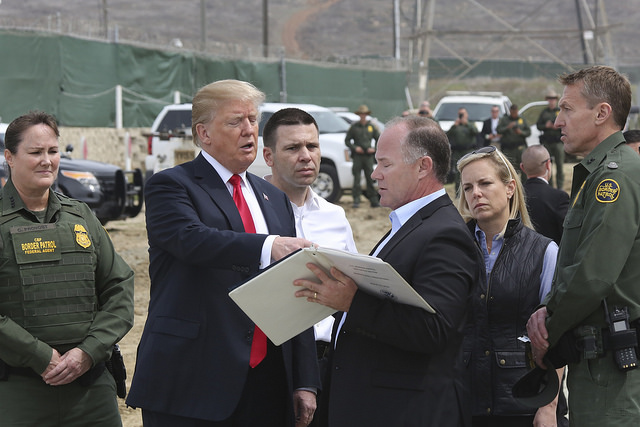How Congress and President Obama Made Trump’s Wall Possible
As part of its effort to construct a border wall, the Trump administration has invoked a statutory delegation of authority signed into law by President Obama after the 2016 election.

Throughout the 2016 election, Donald Trump campaigned for president on the promise that he would build a wall along the southern border. Six weeks after his election in November 2016, Congress overwhelmingly passed a statute—codified as 10 U.S.C § 284—that authorized the secretary of defense to support the “construction of roads and fences and installation of lighting to block drug smuggling corridors across international boundaries of the United States.” On Dec. 23, 2016, a month before leaving office, President Obama signed the 973-page bill into law without any objection to this provision.
On Feb. 15, the Trump administration invoked this express statutory delegation of authority to do what the statute says: “construct ... fences ... across international boundaries of the United States.” Specifically, the president identified up to $2.5 billion under the Department of Defense funds that were designated for counterdrug activities. This provision does not turn on the declaration of a national emergency pursuant to 10 U.S.C. § 2808, which the president also invoked in a proclamation issued the same day. Critically, the White House stated that “these funding sources will be used sequentially and as needed.” The “emergency” funds may not be tapped until the other, less controversial funds are depleted. Plaintiffs may not have standing to challenge the diversion of “emergency” funds until those funds are in fact allocated. Through § 284, both Houses of Congress willingly gave President Trump a path to build at least part of the wall.
This episode illustrates how Congress long ago relinquished its lawmaking powers. The legislature enacts omnibus bills that few members actually read. Often, these super-duper-statutes contain nearly-limitless delegations of authority to the executive branch, with only the flimsiest guidelines on how and when that authority should be executed. Other times, Congress gives the president the exact authority he needs, with few strings attached. Such is the case with § 284: Obama signed a bill into law that gave his successor the very precise power to “construct ... fences ... across international boundaries of the United States.” Moreover, a predecessor of this statute, known commonly as Section 1004, has been in effect since 1990. Critically, other long-standing provisions allow the president to shift appropriations around to fund that construction.
Trump’s decision to rely on § 284 reflects, once again, an instance where he relies on express delegations of power to accomplish awful policies. Congress cannot claim that the president is subverting the rule of law when it gives him the precise authority he needs to accomplish his goal. In January 2017, Democratic Senator Jack Reed said that Congress could block the president from relying on this statute to fund the fence—and certainly that could work prospectively. But Congress is responsible for enacting this statute in the first place.
This executive order isn’t the first instance in which Trump has relied on express statutory authority to implement a terrible policy. For example, in Trump v. Hawaii, the Supreme Court found that 8 U.S.C. § 1182(f) authorized the president to implement the travel ban. This statute provided, in part, that the president could deny entry to “aliens or ... any class of aliens into the United States” that he deems would be “detrimental to the interests of the United States.” Some lower court judges found that this broad statute violated the nondelegation doctrine. At the time, I argued that precedent foreclosed this argument: Five decades ago, the Supreme Court recognized that the president has inherent authority to exclude aliens. This delegation placed Trump in Justice Robert Jackson’s first Youngstown tier. Trump v. Hawaii did not need to reach this issue. Justice Clarence Thomas did, though I have doubts about whether his opinion is correct as an original matter. If Congress is not pleased with President Trump’s use of Section 1182(f), it should modify the statute. (I hope it does so in the future.)
Like Obama, Trump turned to executive action after Congress refused to legislate his preferred agenda—but beyond that, Trump’s policies contrast with several of Obama’s most prominent executive actions. For example, the Deferred Action for Childhood Arrivals (DACA) and Deferred Action for Parents of Americans and Lawful Permanent Residents (DAPA) programs did not stand on express delegations of authority. Rather, the Department of Homeland Security relied on an executive practice known as “deferred action,” and two general statutes. 6 U.S.C. § 202(5) states, “the Secretary shall be responsible for ... establishing national immigration enforcement policies and priorities.” 8 U.S.C. § 1103(a) states, in part, “the Secretary of Homeland Security shall be charged with the administration and enforcement of this chapter and all other laws relating to the immigration and naturalization of aliens.” Were the president to rely solely on these statutes, as I’ve argued, DAPA would violate the nondelegation doctrine.
The same cannot be said for 10 U.S.C § 284. Congress wittingly enacted a statute that allowed Trump to do what he had promised to do. Not even a robust application of the nondelegation doctrine—which I favor—would provide a basis to challenge this exercise of authority. Under modern doctrine, the new executive policy is well within the bounds of Congress’s power to delegate authority.
Ultimately, I fault Trump for pursuing this unfortunate policy. But I place greater blame on Congress, which long ago stopped enforcing its legislative powers. Peter Schuck accurately summarized the situation: “By failing to define crucial terms, legal standards and accountability rules, Congress has handed presidents an all-too-handy tool of tyranny commonly used by autocrats.” Until Congress does its job, the courts will be unable to restore the separation of powers.



.png?sfvrsn=48e6afb0_5)

